|
De Zwitserse schrijfster Hanna Johansen (eig. Hanna Margarete Meyer) werd geboren op 17 juni 1939 in Bremen. Zie ook alle tags voor Hanna Johansen op dit blog.
Uit: Ich bin hier bloß die Katze
“Wir haben einen Hund
Wir haben einen Hund. Man kann sich fragen, ob es nötig ist, einen Hund zu haben. Aber Mama und Papa stellen solche Fragen nicht. Und wenn sie es täten, wäre ich be-stimmt die Letzte, die gefragt würde. Darum haben wir einen Hund. Man sagt das so. Aber es ist falsch. Eigentlich sollte ich sagen: Meine Familie hat einen Hund. Eines Tages wurde er von Mama auf dem Arm herein-getragen und auf den Teppich gesetzt. Er schnüffelte. Alle waren vollkommen aus dem Häuschen. Mama und Papa starrten den Fellhaufen an und verdrehten die Augen. Die beiden Großen begannen sich zu prügeln, um herauszufinden, wer den Hund zuerst auf den Arm nehmen durfte. Das reichte mir. Leise verließ ich das Haus.
Sie wissen ja, wie das ist: Man verlässt das Haus, man wird hungrig. es tun einem die Füße weh, nirgends eine vertraute Stimme, und ein weiches Bett steht auch nicht herum auf der freien Wildbahn. Kurz, am nächsten Tag kam ich zurück, und der Hund war immer noch da. Lange habe ich mir gewünscht, sie würden ihn wieder dahin zurückbringen, wo sie ihn hergeholt hatten. Vergeblich.
Der Hund war da. Er schlabberte. Er hopste. Er rannte unter den Stühlen durch, dass seine Ohren flogen. Die Stühle kippten um. Das Essen flog durch die Küche. Und alles in der Familie drehte sich um das liebe gute süße Hündchen. Das liebe gute süße Hündchen aber hatte nicht mal was dagegen, wenn man es ein liebes gutes süßes Hündchen nannte. Geschmackssache, wenn Sie mich fragen. Nicht mal, wenn es schlief, war das Hünd-chen still. Es schniefte und schmatzte und winselte. Oder es fiepte und wuffte und heulte. Und was das Schlimmste war, die halbe Nacht jaulte es in seinem Korb.
Aber wer weiß, vielleicht würde ich das auch tun, wenn ich in so einem Korb schlafen müsste. Es dauerte gar nicht lange, da hatte er den Korb kurz und klein gebissen. Das war deutlich, sollte man meinen. Aber nein - sie kamen mit einem neuen Korb, der um nichts besser war.
Dass er schlabbert, habe ich wohl schon ge-sagt. Aber nicht, wie er schlabbert. Laut! Sehr laut! Dass ein kleines Tier so laut schlabbern kann, dass man es durchs ganze Haus hört, mag Ihnen unwahrscheinlich vor-kommen. Aber das müssen Sie mir einfach glauben.
Ich hatte in diesen Wochen nur einen Wunsch: Ruhe. Leider ist das ein unerfüll-barer Wunsch, wenn man einen Hund hat. Bloß wenn er spazieren ging, hatte man ein paar Minuten Ruhe.“
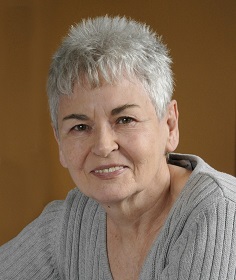
Hanna Johansen (Bremen, 17 juni 1939)
De Amerikaanse dichter, schrijver en diplomaat James Weldon Johnson werd geboren op 17 juni 1871 in Jacksonville, Florida. Zie ook alle tags voor James Weldon Johnson op dit blog.
A Poet To His Baby Son
Tiny bit of humanity,
Blessed with your mother’s face,
And cursed with your father’s mind.
I say cursed with your father’s mind,
Because you can lie so long and so quietly on your back,
Playing with the dimpled big toe of your left foot,
And looking away,
Through the ceiling of the room, and beyond.
Can it be that already you are thinking of being a poet?
Why don’t you kick and howl,
And make the neighbors talk about
“That damned baby next door,”
And make up your mind forthwith
To grow up and be a banker
Or a politician or some other sort of go-getter
Or—?—whatever you decide upon,
Rid yourself of these incipient thoughts
About being a poet.
For poets no longer are makers of songs,
Chanters of the gold and purple harvest,
Sayers of the glories of earth and sky,
Of the sweet pain of love
And the keen joy of living;
No longer dreamers of the essential dreams,
And interpreters of the eternal truth,
Through the eternal beauty.
Poets these days are unfortunate fellows.
Baffled in trying to say old things in a new way
Or new things in an old language,
They talk abracadabra
In an unknown tongue,
Each one fashioning for himself
A wordy world of shadow problems,
And as a self-imagined Atlas,
Struggling under it with puny legs and arms,
Groaning out incoherent complaints at his load.
My son, this is no time nor place for a poet;
Grow up and join the big, busy crowd
That scrambles for what it thinks it wants
Out of this old world which is—as it is—
And, probably, always will be.
Take the advice of a father who knows:
You cannot begin too young
Not to be a poet.
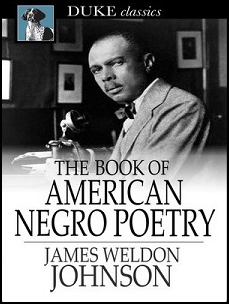
James Weldon Johnson (17 juni 1871 – 26 juni 1938)
Cover
De Australische dichter en schrijver Henry Archibald Lawson werd geboren op 17 juni 1867 in Grenfell, New South Wales. Zie ook alle tags voor Henry Lawson op dit blog.
After All
The brooding ghosts of Australian night have gone from the bush and town;
My spirit revives in the morning breeze,
though it died when the sun went down;
The river is high and the stream is strong,
and the grass is green and tall,
And I fain would think that this world of ours is a good world after all.
The light of passion in dreamy eyes, and a page of truth well read,
The glorious thrill in a heart grown cold of the spirit I thought was dead,
A song that goes to a comrade's heart, and a tear of pride let fall --
And my soul is strong! and the world to me is a grand world after all!
Let our enemies go by their old dull tracks,
and theirs be the fault or shame
(The man is bitter against the world who has only himself to blame);
Let the darkest side of the past be dark, and only the good recall;
For I must believe that the world, my dear, is a kind world after all.
It well may be that I saw too plain, and it may be I was blind;
But I'll keep my face to the dawning light,
though the devil may stand behind!
Though the devil may stand behind my back, I'll not see his shadow fall,
But read the signs in the morning stars of a good world after all.
Rest, for your eyes are weary, girl -- you have driven the worst away --
The ghost of the man that I might have been is gone from my heart to-day;
We'll live for life and the best it brings till our twilight shadows fall;
My heart grows brave, and the world, my girl, is a good world after all.
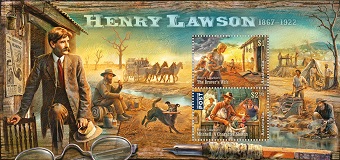
Henry Lawson (17 juni 1867 – 2 september 1922)
Postzegelvel
De Duitse dichter en schrijver Ferdinand Freiligrath werd geboren op 17 juni 1810 in Detmold. Zie ook alle tags voor Ferdinand Freiligrath op dit blog.
Wär′ ich im Bann von Mekkas Toren
Wär′ ich im Bann von Mekkas Toren,
Wär′ ich auf Yemens glühndem Sand,
Wär′ ich am Sinai geboren,
Dann führt′ ein Schwert wohl diese Hand;
Dann zög′ ich wohl mit flücht′gen Pferden
Durch Jethros flammendes Gebiet!
Dann hielt′ ich wohl mit meinen Herden
Rast bei dem Busche, der geglüht;
Dann abends wohl vor meinem Stamme,
In eines Zeltes luft′gem Haus,
Strömt′ ich der Dichtung innre Flamme
In lodernden Gesängen aus;
Dann wohl an meinen Lippen hinge
Ein ganzes Volk, ein ganzes Land;
Gleichwie mit Salomonis Ringe
Herrscht′ ich, ein Zauberer, im Sand.
Nomaden sind ja meine Hörer,
Zu deren Geist die Wildnis spricht;
Die vor dem Samum, dem Zerstörer,
Sich werfen auf das Angesicht;
Die allzeit auf den Rossen hängen,
Absitzend nur am Wüstenbronn;
Die mit verhängten Zügeln sprengen
Von Aden bis zum Libanon;
Die nachts, als nimmermüde Späher,
Bei ihrem Vieh ruhn auf der Trift,
Und, wie vorzeiten die Chaldäer,
Anschaun des Himmels goldne Schrift;
Die oft ein Murmeln noch vernehmen
Von Sina′s glutgeborstnen Höhn,
Die oft des Wüstengeistes Schemen
In Säulen Rauches wandeln sehn;
Die durch den Riß oft des Gesteines
Erschaun das Flammen seiner Stirn -
Ha, Männer, denen glühnd wie meines
In heißen Schädeln brennt das Hirn.
O Land der Zelte, der Geschosse!
O Volk der Wüste, kühn und schlicht!
Beduin, du selbst auf deinem Rosse
Bist ein phantastisches Gedicht! -
Ich irr auf mitternächt′ger Küste;
Der Norden, ach, ist kalt und klug.
Ich wollt′, ich säng′ im Sand der Wüste,
Gelehnt an eines Hengstes Bug.
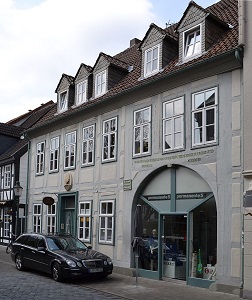
Ferdinand Freiligrath (17 juni 1810 – 18 maart 1876)
Het geboortehuis van de dichter in in Detmold
De Noorse dichter en schrijver Henrik Wergeland werd op 17 juni 1808 in Kristiansand (aan de zuidkust van Noorwegen) geboren. Zie ook alle tags voor Henrik Wergeland op dit blog.
The First Embrace
Come to me, grief, on my bosom press,
Lest it should burst with joy’s excess:
Heaven, with disaster, hell, with your pains,
Calm its commotion. For here awhile
She has lain. Strike, foes!
Your shafts but soothe, when they pierce the veins
Of a breast that lows
With the bliss of her thrill and her smile.
Sorrow and trouble have died away
Here, where her face in its loveliness lay.
Drowned she these in the deep of her eye?
Or sucked she their venom? I seemed to mark,
On her smiling lips,
How a tremulous shadow of pain passed by:
And the blue grew dark,
As her eyes’ light found eclipse.
Innocent bride, thou hast joined afresh
Soul with earth, and with God the flesh.
When on my breast, as pure and bright
As a saint’s white robe, thy perfect brow
Gently was lain,
Guilt with its tear-steins vanished quite,
And my mind is now
Like a cleansed and lighted fane.
My heart reflected an inward grace
From the sinless blush of thy maiden face:
To the waft of celestial wings was changed
The tress that wavered over me;
And, O joy, my soul,
Demoniac once, from heaven estranged,
Is, thanks to thee,
Darling, restored and whole.
I feel, where thy loving lips have pressed,
A glory shining within my breast,
And O, the paeans of love that burst,
At the touch of thy passionless, drowsy kiss.
I was fired and manned, -
While my fancy drank with a burning thirst
All the sweet of this
By a tender angel’s hand.
Love, while you lay by my beating heart,
What burgeoning blossoms seemed to start!
Blossoms that lived, and dreamed, and thought.
Almond or apple ws never so gay;
So rich a stream
Of the sun’s blood never the roses caught.
My soul its clay
Left in a blissful dram.
Cold, dark spirit, hold thee apart,
Or blend with the blood that stirs my heart;
Let it flow supreme in its pulses still,
Let nerves aquiver their passion prove,
And in ecstasy
Hark to the breast’s tense chords athrill,
Where, tranced in love,
She late at rest did lie.
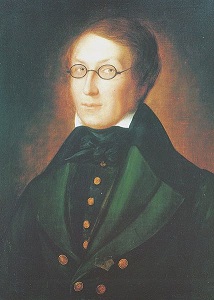
Henrik Wergeland (17 juni 1808 – 12 juli 1845)
Portret door Carl Peter Lehmann, 1842
De Amerikaanse schrijver en journalist John Hersey werd geboren op 17 juni 1914 in Tientsin in China. Zie ook alle tags voor John Hersey op dit blog.
Uit: Hiroshima
“On August 7th, the Japanese radio broadcast for the first time a succinct announcement that very few, if any, of the people most concerned with its content, the survivors in Hiroshima, happened to hear: "Hiroshima suffered considerable damage as the result of an attack by a few B-29s. It is believed that a new type of bomb was used. The details are being investigated." Nor is it probable that any of the survivors happened to be tuned in on a short-wave rebroadcast of an extraordinary announcement by the president of the United States, which identified the new bomb as atomic: "That bomb had more power than twenty thousand tons of TNT. It had more than two thousand times the blast power of the British Grand Slam, which is the largest bomb ever yet used in the history of warfare." Those victims who were able to worry at all about what had happened thought of it and discussed it in more primitive, childish terms – gasoline sprinkled from an airplane, maybe, or some combustible gas, or a big cluster of incendiaries, or the work of parachutists; but, even if they had known the truth, most of them were too busy or too weary or too badly hurt to care that they were the objects of the first great experiment in the use of atomic power, which (as the voices on the short wave shouted) no country except the United States, with its industrial know-how, its willingness to throw two billion gold dollars into an important wartime gamble, could possibly have developed.”
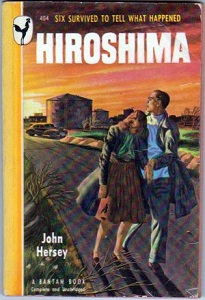
John Hersey (17 juni 1914 – 24 maart 1993)
Cover
De Duitse schrijver Felix Hartlaub werd geboren op 17 juni 1913 in Bremen. Zie ook alle tags voor Felix Hartlaub op dit blog.
Uit: Italienische Reise
“Freitag, 22 Mai [1931]
Mässig geschlafen. trübes Wetter. Marsch zum Bahnhof Fluelen. Das Tal ganz flach. Häuserdächer kaum geneigt, Kulturebene. hart daneben steil aufsteigende Berge, lauter Senkrechten, Wald u. Geröllzungen. Athmosphäre blendend, unübersichtlich. verschiedene Wolkenschichten; Schwarze und besonnte Berge. Fahrt Fluelen–Bellinzona. Flaches Tal verengt sich rasch, Talgrund wird bewegt, Felsblöcke, bunte Wiesen. Rauch u. Wolken. Schwarze Bergrücken, Tannen u. dunkler Fels. Wasserläufe und Scheebänder bis auf die Talsohle. Gotthard.
Ienseits erst graue Hochlandschaft, traurig stimmend. Schnelle Fahrt bergab. Tannen verschwinden, helle Laubbäume, Akazien u. Kastanien zwischen bunten Felsbrocken. Orte hochliegend, wehrhaft, keine zerstreuten Gehöfte mehr. Tessinlauf. Landschaft viel geordneter, gestufter. Himmel höher, Schnee, Nebel, Wasser voneinander geschieden. Wasserfälle, Tessiner Kirchen, Weinlauben.
Bellinzona. Essen in einer Gartenwirtschaft. Marsch Bellinzona–Locarno–Askona. Regnerisches Wetter, zum Schluss richtiger Landregen. Kastell, Mauergürtel, Gewitterbeleuchtung. Strasse am Rande des Tessintales, rechts Bergwand: Gebüsch u. Weinberge, Felsbänder voll Ginster und Fettpflanzen. links Talgrund, dichter Baumwuchs, nasses Grün, Vogelstimmen. Schön geschwungene Bergrücken dahinter, in Wolken verrauchend. Anwesen mit Loggien, Rosensträuchern. Dächer mit Steinplatten, merkwürdige Kamine. Stärkerer Regen, Müdigkeit, Blasen am Fuss. In der Ferne der Lago maggiore grau-weiss.
Locarno. das Schwemmland des Tessin hört auf, der Lago weitet sich. Südliche Vegetation, über hohe Gartenmauern der Villen quellen Feigenbäume, Bambusgebüsch, Blutbuchen. Bahnen mit gelben Blüten. Strassenarbeiten, Lastwagen. Kirche und Hotels. Weg nach Askona durch nasse Uferlandschaft. Akazien u. Weiden. Vor uns wiegt sich eine wundervolle Gruppe von Vorbergen in Wolken. Übergang über die Maggia. Ankunft bei Kohlers. Modernes Haus über Treppengarten. Blick von der Terasse auf Kirche mit offenem Glockenstuhl, Rad u. Ort. See u. Himmel eins. Nachtquartier im weiten Raum, Holztisch u. Kamin."
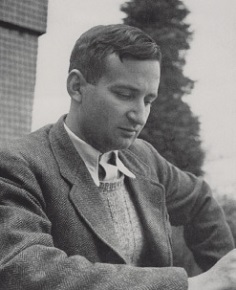
Felix Hartlaub (17 juni 1913 – begin mei (?) 1945)
De Tsjechisch-Oostenrijkse schrijfster Ossip Schubin (eig. Aloisia Kirschner) werd geboren op 17 juni 1854 in Praag. Zie ook alle tags voor Ossip Schubin op dit blog.
Uit: Vollmondzauber
“Emma Ginori lag in Zdibitz in ihrem Bett, ein kühlendes nasses Tuch um die Stirne. Heute morgen gleich beim Aufwachen hatte sie es gemerkt, daß ihr eine Migräne drohe. Dennoch war sie aufgestanden, hatte sich bemüht, mit Hilfe von großen Dosen Antipyrin das Leiden zu bekämpfen, es zum wenigsten für einen Tag hinauszuschieben.
Gina wollte sie ohne ihren bevormundenden Schutz das Fest in Monbijou nicht besuchen lassen, ihr die Freude zu verderben, widerstrebte ihr ebenfalls; denn sie liebte Gina zärtlich und war stolz auf ihre Schönheit und Begabung, wenn auch mancherlei in ihrem Wesen sie beunruhigte und bereits viele Verwickelungen in ihr Leben hineingebracht hatte. Gottlob, seit einiger Zeit ging es ruhiger zu, und vielleicht, wenn man’s recht geschickt anfing, steuerte man jetzt einer günstigen Wendung der Dinge entgegen.
Es galt, vorsichtig zu sein, sie mußte trachten, sich heute auf das Fest zu schleppen. Im Laufe des Vormittags fühlte sie eine leichte Besserung; gegen zwölf Uhr aber stellte sich das Leiden mit verdoppelter Gewalt ein, so daß sie den Kampf aufgeben mußte. Vollständig von ihrer Migräne besiegt, taumelte sie auf ihr Bett nieder, ohne daß ihr irgend ein andres Bewußtsein übrig geblieben wäre, als das ihrer Schmerzen.
Es war eine gräßliche Migräne diesmal, eine von jenen Migränen, die einem langsam alle Glieder lähmend den Rücken hinaufschleicht und sich triumphierend mit den tückischten Martern im Kopf festnistet, so daß dieser sich nicht anders fühlt, als ein riesiger hohler Zahn, in dem tausend Kobolde mit glühenden Eisen herumstechen, ein Zustand, in dem jeder Gedanke Wahnsinn, jede Bewegung tödliche Übligkeit zur Folge hat.“
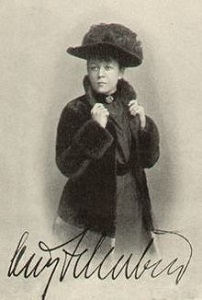
Ossip Schubin (17 juni 1854 – 10 februari 1934)
17-06-2018 om 11:30
geschreven door Romenu 
Tags:Hanna Johansen, James Weldon Johnson, Henry Lawson, Ferdinand Freiligrath, Henrik Wergeland, John Hersey, Felix Hartlaub, Ossip Schubin, Romenu
|

